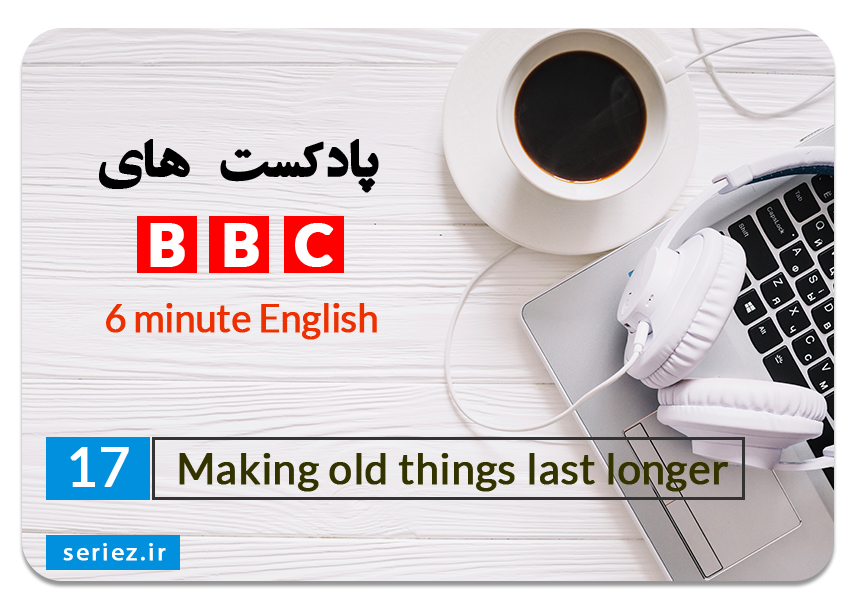پادکست های BBC 6 minute English – Making old things last longer

قسمت هفدهم پادکست های BBC 6 Minute English
در بخش پانزدهم پادکست های ۶ دقیقه ای بی بی سی، 6 لغت مهم با محوریت موضوع Making old things last longer (ارتقای طول عمر وسایل) بررسی می شود.
- ابتدا پادکست را بدون متن گوش کنید.
- آن را دوباره به همراه متن گوش دهید و
- در مرحله آخر لغات آن را مرور کنید.
پادکست شماره 16 (Making things last longer)
A Given عادت، مشخص
Ex: It is a given that he will graduate on time.
مشخصه که به موقع درسشو تموم میکنه.
no-brainer بدیهی، پرواضح
Ex: Taking that job over the one I had was a no-brainer
گرفتن اون شغل به جای شغلی که قبلا داشتم بدیهی و پرواضح بود (اصلا نیاز به فکر نداشت)
stuff چیز،وسایل
Ex: ?Have you got your tennis stuff
peer effect تاثیر اطرافیان
Ex: As children go through adolescence, peer influence becomes much more important.
با ورود بچه ها به سنین نوجوانی، تاثیر اطرافیانشون مهم و مهمتر میشه.
foster ترویج و گسترش دادن
Ex: The club’s aim is to foster better relations within the community.
هدف این باشگاه ترویج روابط بهتر در جامعه است.
be mainstream بحث روز شدن، روندکلی، جریان کلی یا جریان اصلی
Ex: They made the clothes less high-fashion and more mainstream.
لباس رو از حالت فوق مدرن خارج کرده و به صورت امروزی تر درست کردند.
Rob
Hello. This is 6 Minute English from BBC Learning English. I’m Rob.
Sam
And I’m Sam.
Rob
So, how are you today, Sam?
Sam
Don’t ask, Rob! Today’s been a nightmare! This morning I ripped my jeans and later my computer stopped working! Then, when I tried taking it to a repair shop, my car wouldn’t start!
Rob
Oh no, that’s terrible! And the really bad news is that in today’s consumer culture, when something breaks we usually throw it away and buy a new one, instead of trying to repair it.
Sam
In this programme, we’ll learn all about repairing broken things by asking what would happen if we stopped junking and got better at fixing.
Rob
The world generates over two billion tonnes of rubbish every year.
Sam
So we’re visiting companies in Sweden making it easier to mend things when they break instead of replacing them – whether that’s clothes, bikes or washing machines.
Rob
And my quiz question is about one of those companies – Fixi, a repair service that collects broken bikes from your door and brings them back fixed. The company was started by Rafi Mohammad, a student of Industrial Innovation at the University of Stockholm. But what was the inspiration behind Rafi’s idea? Was it:
a) he wanted to impress his girlfriend?,
b) he was sick of breathing in the city’s car fumes?, or
c) he was late for his lecture because of a flat tyre?
Sam
I’ll say, a) he wanted to impress his girlfriend.
Rob
OK, Sam, we’ll find out about Rafi and his love life later on. But whatever the inspiration behind it, Rafi’s idea was a success – Fixi took more than six hundred orders in its first six months.
Sam
Rafi’s isn’t the only Swedish company helping people fix things instead of buying new. Denim company, Nudie Jeans, was started with a focus on ethics and sustainability.
Rob
At 150 dollars a pair, Nudie jeans aren’t cheap but they do promise free repairs for life, from ripped knees to torn pockets.
Sam
BBC World Service programme, People Fixing the World, asked students Felix and Fabia Morgen, why they bought the jeans, despite the high price tag.
Felix Morgan
It’s just been a given that when your jeans break, you throw them away, so when I heard that you can repair them easily without any cost then it was a bit of a no-brainer for me.
Fabia Morgan
I really liked the way they looked, so for me it’s worth it to buy more expensive but stuff that I really like.
Rob
Felix says that throwing out old jeans is a given – something that is just assumed to happen.
Sam
For him, buying Nudie jeans is a no-brainer – a decision that’s very easy to make.
Rob
And Fabia agrees. She doesn’t mind paying more for stuff she really likes. Here, stuff is an informal way to say personal objects and possessions.
Sam
Even though they’re good at recycling, people in wealthy Sweden still buy lots of new stuff and they have a big carbon footprint for a country of just 10 million.
Rob
But it’s interesting that all the innovators behind these companies say that in their grandparents’ day, it was normal to repair, fix and mend broken stuff.
Sam
Jessika Richter is a researcher at Lund University. She thinks repairing is an endangered activity that we used to do more of, both individually and as a society.
Rob
Here she is talking to BBC World Service’s, People Fixing the World programme, about the need to get back in touch with older ways of doing things:
Jessika Richter
It really is a peer effect and a culture that we’re trying to foster here – changing a culture of consumption. The more people that are repairing and the more people that are choosing to buy repair services or more repairable products, the more we will see this going mainstream – and it used to be mainstream, so that’s what makes me positive too, that it is in some ways a return to what we used to be able as a society to do more of.
Sam
Stories about Sweden’s repair shops spread between friends and Jessika thinks this creates a peer effect – the positive or negative influence friends have on the way you behave.
Rob
She hopes this will foster – or encourage to grow – a new culture of sustainable consumption…
Sam
…so that fixing broken stuff will be mainstream, or be considered normal, once again.
Rob
Yes, that’s a big part of the problem – repairing was something we all used to do, but seem to have forgotten.
Sam
Hopefully, we’ll all be inspired to start fixing things again, or at least pay someone else to! And speaking of inspiration, what was the answer to your quiz question, Rob?
Rob
Ah yes, I asked about the inspiration behind Rafi Mohammad’s company, Fixi.
Sam
I think he started the bike repair service to a) impress his girlfriend. Was I right?
Rob
Ah Sam, that’s very romantic … but the correct answer was c) he was late for his lecture because of a flat tyre.
Sam
Well, I’m sure if he had a broken heart, he’d be able to mend it.
Rob
Indeed. Well, in this programme, we’ve been hearing about repairing broken stuff – things, or personal possessions.
Sam
That people would fix something broken used to be a given – assumed to be true or certain to happen.
Rob
Repairing things used to be a no-brainer – the obvious choice.
Sam
A peer effect is influence of peers and friends on someone’s behaviour.
Rob
Some Swedish companies are trying to foster – or encourage the development of – a new culture of consumption.
Sam
So that once again, fixing things is mainstream – accepted as normal or common practice.
Rob
That’s all from us. Bye for now!
Sam
Bye bye!
حال می توانید به سوال های زیر پاسخ دهید:
- Do you fix or replace broken stuff?
- Does peer effect make you buy instead of repairing?
جواب هاتون رو کامنت کنید…


دیدگاهتان را بنویسید
برای نوشتن دیدگاه باید وارد بشوید.